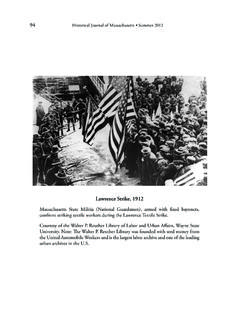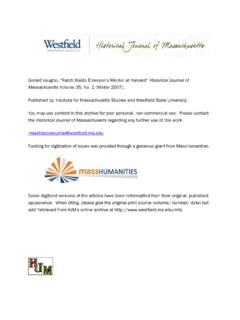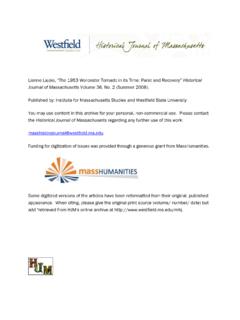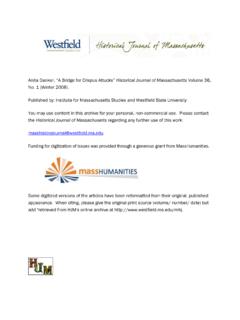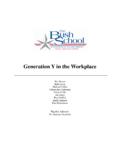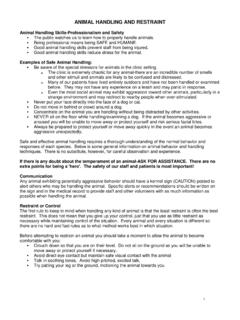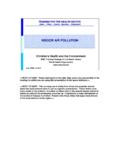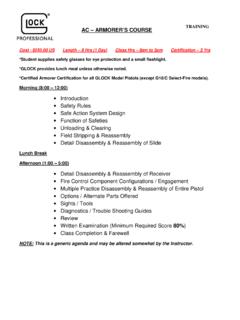Transcription of Published by: Institute for Massachusetts Studies …
1 Steven Taylor, Progressive Nativism: The Know-Nothing Party in Massachusetts Historical Journal of Massachusetts Volume 28, No. 2 (Summer 2000). Published by: Institute for Massachusetts Studies and Westfield State University You may use content in this archive for your personal, non-commercial use. Please contact the Historical Journal of Massachusetts regarding any further use of this work: Funding for digitization of issues was provided through a generous grant from MassHumanities. Some digitized versions of the articles have been reformatted from their original, Published appearance. When citing, please give the original print source (volume/ number/ date) but add "retrieved from HJM's online archive at Editor, Historical Journal of Massachusetts c/o Westfield State University 577 Western Ave.
2 Westfield MA 01086 Progressive Nativism: The Know-Nothing Party in Massachusetts By Steven Taylor The mid-19th century success of the Know-Nothing Party was not merely the result of ethnocentric bigotry and religious intolerance, but also of a clash of political cultures. The Know-Nothing Party, whose official name was the American Party, is widely known for its strident anti-Catholicism and for its anti-immigrant positions. What is lesser known about the American Party is that in some of the northern states the Party was quite progressive on other issues. In no state did the American party reap as much success as in Massachusetts . In 1854 the Party captured the governor s office, the entire state senate, and virtually the entire state house of representatives.
3 The American Party also took over the City of Boston and other municipalities in the Bay State. Once in office, the Party not only passed legislation that reflected the anti-immigrant positions of the national Know-Nothing movement, but the party also distinguished itself by its opposition to slavery, support for an expansion of the rights of women, regulation of industry, and support of measures designed to improve the status of working people. These progressive measures appear to be inconsistent with the anti-immigrant and anti-Catholic stance of the American Party. This article takes a look at the origins and the background of the Massachusetts Know-Nothing movement and the reason for what might appear to be stark contradictions.
4 The American Party had its origins in a nativist organization called the Order of the Star Spangled Banner. The Order was a secret society with lodges throughout the United States. Members of the Order took an Historical Journal of Massachusetts , Summer 2000 168oath that they would not reveal information about the membership of the Order. When asked, they were to deny any knowledge, hence the sobriquet the Know-Nothing Party was given to the American Party. The Party s candidates for office were required to be members of a local lodge. One of the major purposes of the Order of the Star Spangled Banner was to preserve what the members believed to be American culture, which they felt was endangered by Catholic immigrants, particularly those from Ireland.
5 The state of Massachusetts , which had the highest percentage of Irish immigrants, was a stronghold of the American Party. When the Party came to power in Massachusetts in 1855, the state legislature (known as the General Court ) and the governor, Robert Gardner, acted on the Order s nativist agenda. Upon taking control of the Commonwealth of Massachusetts , the American Party proposed and passed legislation aimed at restricting the strength of the growing Irish community in Boston. The most drastic measure proposed was a constitutional amendment requiring that immigrants wait 21 years after naturalization before they could become voting citizens of the Commonwealth.
6 Another proposed bill would require that they wait an additional two years before they could hold public office in Massachusetts . The 21-year amendment did not receive the necessary two-thirds vote required for adoption. Nevertheless, the General Court passed a resolution calling on the federal government to extend the residency period to 21 years before an immigrant could vote in federal elections. The Know-Nothing General Court also proposed a legislative redistricting that would reduce the number of seats in predominantly immigrant Boston. This benefited the rural areas, which were predominantly populated by Yankee descendants of English While working to curb the voting power of immigrants, the Know-Nothing General Court passed measures aimed at limiting the influence of the Catholic Church.
7 One of the most infamous acts passed was the establishment of a Nunnery Committee to investigate convents in In addition, the legislature also passed a bill requiring a daily reading of the Protestant King James Version of the Bible in public 1 William G. Bean. Party Transformation in Massachusetts with Special Reference to the Antecedents of Republicanism, 1848-1860. dissertation, 1922, p. 202. 2 Bean, Party Transformation in Massachusetts , p. 241. The Know-Nothing Party in Massachusetts 169schools, voted to ban aid to sectarian schools, and they voted to expunge a Latin inscription from above the desk of the Speaker of the state House of The legislature also passed an amendment barring from office any person who owed allegiance to a foreign prince, power, or potentate.
8 This was aimed at Catholics, whom the legislators believed were loyal to the Pontiff in Rome. Like the 21-year amendment, this did not receive the two-thirds vote necessary for a constitutional Nativist measures such as those listed above were proposed and/or passed in other states where the American Party had legislative strength. Connecticut, Rhode Island, Maine, and New Hampshire enacted laws restricting naturalization, while Connecticut and Massachusetts passed legislation requiring English literacy tests for those who wished to vote. Connecticut also passed a property law mandating that a lay board of trustees hold the title to church real estate. Also passed in both Massachusetts and Connecticut were acts dissolving Irish-American militia units that had previously been certified by the two states.
9 Nativists had fears of an armed Irish populace. In Massachusetts nativists were particularly angry with Irish militia units after one such unit, the Columbian Artillery, stood guard to prevent a captured slave from Though the nativists demonstrated a great deal of intolerance toward immigrants, the American Party in Massachusetts and other Northern states was in the forefront of the political struggle against the expansion of slavery. The Party in Massachusetts went on record as opposing the Fugitive Slave Law, which mandated that free states return slaves to their Southern owners. Massachusetts Know-Nothings also favored a reinstitution of the Missouri Compromise, which prevented the extension of slavery into newly acquired territories.
10 The Compromise was disbanded when Congress passed the Kansas-Nebraska Act, an act strongly opposed by Massachusetts Know-Nothings. 3 John R. Mulkern, The Know-Nothing Party in Massachusetts : The Rise and Fall of a People s Movement (Boston: Northeastern University Press, 1984), pp. 101-102. 4 Tyler Anbinder, Nativism and Slavery: The Northern Know- Nothings and the Politics of the 1850s (New York: Oxford University Press, 1992), pp. 136-140. 5 Bean, Party Transformation in Massachusetts , p. 241. Historical Journal of Massachusetts , Summer 2000 170 When the American Party took over the General Court, the legislators passed a resolution declaring that the Fugitive Slave Act was a violation of the 10th Amendment.
